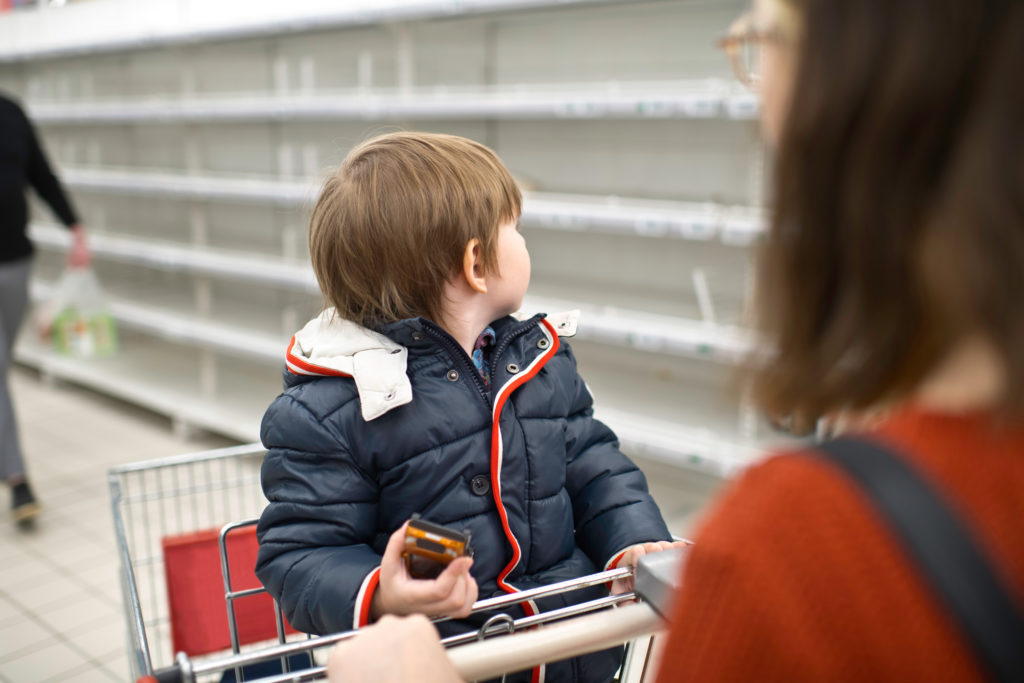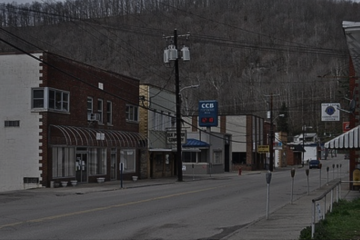Last week, I received a text from a friend asking me to keep an eye out at stores for baby formula. I don’t have children, but their daughter – a 6-month-old whom I adore – is always in the front of my mind when I read news or hear stories while reporting about childhood health outcomes in West Virginia.
It’s scary to think how my friends – who live in Kanawha County, own cars and therefore have more access to groceries and fresh food than many others in the state – couldn’t find this basic necessity. I immediately thought of my previous reporting on rural food deserts in the state, and the people who run food pantries within them. Diapers and baby formula are often some of the most requested items, and here we are in the middle of a crisis where even those who have the means to pay exorbitant prices for such a basic amenity can’t find it.
In McDowell County, Linda McKinney runs the Five Loaves and Two Fishes food pantry. There, thousands of families rely on the pantry monthly for food.
Over the past few weeks, she said she’s received dozens of calls from new mothers and caregivers for babies who are scared about the dearth of formula. They ask her what they should do, what they should feed them and how they keep their babies healthy.
“I don’t want to tell them what to do. I’m not a pediatrician, you know?” Linda told me. “They need to listen to their doctors, but there’s really no answer when the thing you need isn’t available.”
The McKinney’s keep a large warehouse at the food pantry stocked with everything from fresh food to toys and clothing. They bottle their own purified water – sourced from a hydro-panel system that grabs water from the air – to be used with the formula they provide to families in McDowell. But now, Linda said, the shelves that usually hold the formula are bare.
It’s frightening, Linda said, especially in a community where hundreds of grandparents are taking care of children. Grocery stores in the region are few and far between. The local Goodson’s Supermarket stocks what it can, but getting wholesalers to deliver food and supplies to the mountainous area – specifically fresh food – can be more expensive than in more accessible, metropolitan areas. Those costs are often pushed off to consumers, many of whom rely on government programs like WIC and SNAP to feed their families.
I’ve talked to doctors in Southern West Virginia for years who have been trying to sound the alarm on childhood health in rural areas. For many towns and counties, most affordable dining options are fast food restaurants. Community grocers have been replaced by Dollar Generals and convenience stores, where frozen foods and canned goods often account for more than 90% of the grocery aisles.
Families want their children to be healthy, but they lack access to services and infrastructure to support that health. There’s no way to affordably transport healthy food to hills and hollers. Cash-strapped schools already serve as feeding centers for many. Dozens of communities in our state rely on food pantries and food banks to fill service gaps, and such systems can be difficult to navigate.
The offerings change month-to-month depending on what’s available. One month there could be plenty of meat, veggies and fruits donated. They’re distributed on a first-come, first-serve basis. The next month, it could be boxed snacks and processed foods. It’s a market dictated by what others decide to give.
The recent baby formula shortage has, unfortunately, brought a reality faced every day by thousands of West Virginians to the forefront for millions of others who likely never thought it’d happen to them.
Statewide, West Virginia is not in a position to adequately confront supply chain issues that lead to food and resource shortages of any kind. One in five children in our state faces hunger daily. We need nearly $114 million annually to fill that hunger gap.
Statewide, West Virginia is not in a position to adequately confront supply chain issues that lead to food and resource shortages of any kind. One in five children in our state face hunger daily. We need nearly $114 million annually to fill that hunger gap.
Caitlin Cook, the director of advocacy and public policy at Mountaineer Food Bank (and also, to be transparent, a personal friend), said her organization is feeling the immediacy of the situation.
They serve 48 of the state’s 55 counties. The program recently hasn’t been able to access protein for its clients, a main staple of a healthy diet.
Chickpeas and other products are serving as a substitute for meat. While nutritious, it’s still not the same, Caitlin said. And while today the issue is protein and baby formula, next month it could be anything.
The state has no infrastructure in place to stock up on food in cases of emergency or shortages. When those hit, people already struggling and relying on food pantries or food banks are often the first to go without. Many are children who are losing out on crucial nutrients that can make it even more difficult for them to succeed in school, or to understand and cope with emotional issues and trauma.
Caitlin has two young girls of her own. As a mother, she has a different perspective to share when we talk about hunger issues because she has two little ones who rely wholly on her and her wife to provide for them. When we talk about these things – me telling her what I’ve heard from families in need and how it worries me, and her sharing the same then filling me in on the logistics of how these issues work – I think about how lucky we are to know how to navigate these systems.
If I find someone in need, I can refer them to her or, depending on where they are, a service provider in their community. That knowledge, though, comes from years of experience learning about and exploring these systems and speaking with the dedicated, overworked people who run them.
The pandemic has forced many in our state and others into new levels of poverty. Hundreds, if not thousands, are relying on feeding programs for the first time ever. How in the world could a regular person who isn’t paid to navigate these systems – and is likely trying to do so while facing a legitimate health crisis – figure it out on their own?
When I spoke to Caitlin about this, she mentioned a potential silver lining. The baby formula shortage is nothing but a tragedy, but maybe just maybe, it will force congress to act and invest in programs like the Emergency Food Assistance Program that could offer crucial support for people who are struggling.
It shouldn’t take a nationwide crisis to bring hungry families and children to the forefront of lawmakers’ minds. We need feeding programs that exist outside of summer vacations and school hours. Feeding programs that are accessible for everyone, no matter who they know. The state and its legislators need to recognize the toll hunger is taking on our youngest generation every day, not just today.
Caity Coyne is our correspondent for The Health and Hunger Project. Learn more and join us for this year’s summit by registering on the project’s webpage.





0 Comments